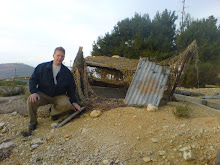
Dinner with David Trimble.
We had David (Lord) Trimble down in Devon this weekend for a fund raising dinner for my election campaign.
Held at the Orestone Manor Hotel, our palates were stimulated with a gourmet dinner of ribeye steak with Merlot sauce or fillet of guilt head bream, while our intellects were stimulated by a Nobel Peace Prize winning politician.
I have hosted or arranged many scores of these events both here in Torbay and formerly as the Chairman of Windsor conservatives.
Usually the guests are all dedicated political activists and the speech is often simply a tub-thumping call to arms.
To be fair pitching the speech at the right level is difficult at the best of times. Most experienced politicians can 'read' the audience mood, and give them what they want (but not all, - I remember in particular an excruciating 'We are on the verge of a great victory' monologue from Jeffrey Archer at the Windsor Guildhall in 2001 shortly before we went down to our second worst election result in history and he went off to prison.)
What made Friday evening so very different was that it was not a members event, so many of the guests were not necessarily Conservative voters. Although he now takes the Conservative Whip in the Lords David Trimble was there to talk about his time as leader of the Ulster Unionist Party and his negotiation of the Good Friday Agreement which paved the way for the lasting peace enjoyed by the province ever since, and it was not a party political speech at all.
The early foundation of these talks was laid while John Major was PM and the deal was done with Blair so uniquely for one of our dinners Trimble could tell us about the workings of both a Conservative and Labour administration.
There were fascinating behind-the-scenes anecdotes about discreet direct talks with Gerry Adams and Martin McGuinnes which were in places both amusing and revealing.
What came across the most to me about him is the incredible courage and determination he showed in leading his very reluctant Unionist peers from supporting confrontation and violence to instead supporting the talks that led to peace.
Weak politicians merely parrot the prejudices of their electors, strong politicians show us that there is a better place; but it requires a truly great politician to actually lead you there.
Like Churchills Tories in 1945, he paid a high political price for his historic achievement, the UUP were routed by the DUP and in the 2005 election David Trimble lost his seat.
He has not stopped working to embed peace in the Province. He believes that the next phase of normality in Northern Ireland politics will come when the political choice is framed the same there as it is in Scotland, Wales and England.
He is optimistic that the merger deal recently announced between the UUP and the Conservatives in Northern Ireland will for the first time enable voters there to focus on the same question as the rest of the British Isles at the General Election namely: do they want Gordon Brown or David Cameron for PM?
If Northern Irish voters feel able to vote freely - on issues like lower tax, better education and investment in our hospitals - and not on religion - it will be the very best evidence possible that normal life has returned for good.
I am very grateful to him for coming down to see us, it was a brilliant and very illuminating evening and a great success.










.jpg)

